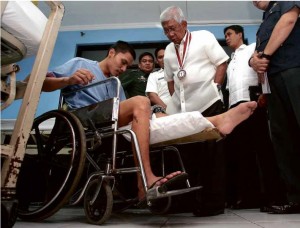MANILA, Philippines—It’s not what he lost, but what he gave up for the country.
Wheelchair-bound after losing his legs, Army Staff Sergeant Ludy Omongos still keeps his back straight and bellows a snappy “Yes, sir!” before Defense Secretary Voltaire Gazmin.
Omongos is one of the 68 soldiers visited Thursday by Gazmin at the AFP Medical Center in Quezon City for his annual Christmas salute to those who had been wounded in battle. They include soldiers who had seen action in the Zamboanga siege by Moro rebels last September.
“I don’t regret becoming a soldier,” a smiling Omongos, 40, told the Inquirer in Filipino. “I lost my legs as part of my job. I am proud because I was able to serve. This was for the Philippines, for the people.”
The defense department on Thursday distributed gift packs to 68 battle casualties, each worth some P2,000.
Christmas gift
“Our Christmas gift may be small if you consider how much it costs. But we want to show you our admiration for all of you, and tell you that we never forget the heroism you did for our country,” Gazmin said in Filipino.
A former military general himself, Gazmin told the soldiers that he knows the kind of heartache brought by the holidays to people like them who have chosen to serve the country.
“Once upon a time, I was a soldier that’s why I know of the places you’ve been telling me about. I know the hardship you are going through, not only the pain brought by your wounds but even the loneliness you feel when December comes, because normally that is the time when families get together,” Gazmin said.
But he hailed the soldiers for their heroism, for fighting the enemy to ensure the security of the people. In fact, Gazmin said he gave priority to his visit to the soldiers over his other appointments on Thursday.
Our heroes
“I dropped everything in my schedule to be with you and to personally greet you and tell you that all of you are our country’s heroes,” Gazmin said.
On Oct. 22, 2011, while on a mission against the Abu Sayyaf in Basilan, Omongos tripped on a wire that activated a land mine set up by the terrorists. The explosion ripped off his left leg instantly and severely wounded his right leg, which was amputated a year later.
It was the first injury he sustained in his 18 years in the armed service. A year after Omongos lost his legs, his only son, Kenny James, drowned while on vacation in Manticao, Misamis Oriental. Kenny, then 16, had kept his father company while he recuperated at the military hospital.
Omongos is likely to spend Christmas with his fellow wounded soldiers, as he is not certain if his wife, who stays in the province, would be able to visit him at the hospital.
First Lieutenant Sheldon Kallos, the head nurse at the Heroes’ Ward of the AFP Medical Center, said Omongos has always kept a positive attitude despite the tragedies in his life.
“What’s nice about our soldiers here is that they comfort each other, especially when one’s morale is low,” Kallos said.
The military nurse described Omongos as the “strong one.”
Counselor
In fact, Omongos serves as a counselor to fellow amputee, Private First Class Roque Ganalon, who at 24 lost his right leg in an encounter with communist rebels in Isabela one night in August.
Ganalon, a soldier for the past four years, still grapples with reality. The youngest in a brood of six, Ganalon entered the military service because it was the only job available to him.
Ganalon recounted that he did not see the enemy in front of him. “It was dark and most of them were hiding inside a nipa hut,” he said.
Like Omongos, Ganalon did not immediately feel the pain of a shattered leg.
Ganalon hardly smiled from his hospital bed and had a faraway look while Gazmin and other military officials mingled with his fellow soldiers.
Omongos said he often talks to Ganalon, helping the young soldier keep his spirits up, telling him that life does not end after losing one leg.
Not disabled
Kallos said the military does not label soldiers like Omongos and Ganalon “disabled.”
The defense department regularly holds seminars for the wounded soldiers to teach them new skills they can put into good use once they are ready to work again either in the agency or the military headquarters.
Both Omongos and Ganalon see themselves back in uniform, although doing office work this time, as soon as they get their prosthetic legs, the cost of which would be shouldered by the military.
“Many of our patients here are raring to go back to the field,” Kallos said, laughing at the irony that while soldiers are not afraid of bullets, many of them are scared as hell of injections.
